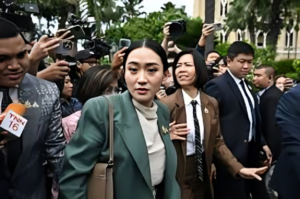PAETONGTARN SHINAWATRA’S SUSPENSION AFTER LEAKED PHONE CALL: A DEEP DIVE
Introduction
Thailand’s political landscape was sent into turmoil when Prime Minister Paetongtarn Shinawatra faced suspension following the leak of a private phone conversation with former Cambodian leader Hun Sen. Accusations of betrayal and allegations of undermining national interests have dominated headlines, sparking debate both within Thailand and across Southeast Asia. This article explores the events leading to the suspension, the content and context of the leaked call, the ensuing political fallout, and what this might mean for Thailand’s domestic and regional future.

Background
Born into Thailand’s most influential political dynasty, Paetongtarn Shinawatra rose quickly in national politics, championing progressive reforms and closer ASEAN cooperation. Her administration has prioritized infrastructure projects, digital transformation, and social welfare programs. Yet her familial ties—daughter of former PM Thaksin Shinawatra—have always been a double‑edged sword, earning her both fervent supporters and staunch critics who see the Shinawatras as symbols of corruption and divisiveness.
The Leaked Conversation
Late last month, an unknown source released a recording of a private call between PM Shinawatra and Hun Sen. In it, the two discussed upcoming bilateral meetings, economic partnerships, and regional security cooperation. However, certain remarks raised eyebrows: references to “strategic concessions” on border trade rules and “coordinated messaging” during ASEAN summits were interpreted by some as plans to sideline Thai interests.
Key points from the call included:
- Border Trade Agreements – Discussion of revising customs protocols to expedite goods flow at Poipet and Aranyaprathet crossings.
- Joint Infrastructure Projects – Preliminary ideas for co‑financed railway expansions connecting Bangkok and Phnom Penh.
- ASEAN Strategy – Talk of presenting a unified front on the South China Sea disputes, with emphasis on messaging agreeable to all member states.
Critics seized on the “strategic concessions” phrase, alleging that Shinawatra was willing to compromise Thai sovereignty for economic gains. Her office, however, insists that all talks were well within diplomatic norms and aimed at bolstering Thailand’s economy.
Political Implications
The suspension was enacted under constitutional provisions allowing the judiciary to remove an official whose actions are deemed detrimental to national security. Opposition parties quickly filed petitions, pointing to the leak as evidence of secretive dealings that bypass parliamentary oversight. Meanwhile, Shinawatra’s party decried the move as politically motivated—a bid to void election results they narrowly won last year.
- Domestic Response:
- Ruling Party argues the suspension undermines democratic choice.
- Opposition hails it as a necessary check on executive overreach.
- Public Opinion is split: urban youth rally behind Shinawatra’s vision, while rural areas express concern over unverified “sell‑out” claims.
- Legal Proceedings:
A constitutional tribunal has been tasked with reviewing whether the content of the call constitutes a breach of official duty. Hearings are scheduled over the next month, with both sides gearing up for a protracted legal battle.

Regional Impact
Beyond Thailand’s borders, neighbors are watching closely. Cambodia’s government, long led by Hun Sen, has sought greater economic integration within ASEAN. Collaborative projects could accelerate growth, but they also risk shifting balance—particularly as China’s influence in the region expands.
- Economic Stakes: Joint infrastructure could unlock billions in trade revenue, but financing and debt servicing remain points of contention.
- Geopolitical Ramifications: Closer Thai‑Cambodian ties may reshape ASEAN’s collective bargaining on issues like South China Sea claims and relations with major powers.
- ASEAN Unity: The bloc prides itself on consensus‑driven diplomacy. Public discord over bilateral talks may test that unity ahead of next year’s summit.
Public Reaction and Media Narrative
Media outlets in Thailand have painted contrasting pictures: state‑aligned channels emphasize security risks and “betrayal,” while independent platforms highlight the economic opportunities on the table. Social media debates have trended under hashtags both supporting and condemning the PM’s actions. Influencers and policy experts alike weigh in, amplifying polarization.
Real‑life voices capture the divide: a Bangkok tech entrepreneur praises Shinawatra’s forward‑thinking approach to digital trade corridors, whereas a provincial farmer fears that liberalized border policies will harm local markets and livelihoods.
Conclusion
The suspension of Paetongtarn Shinawatra marks a critical juncture in Thailand’s modern political history. At stake are not only her administration’s immediate policy agenda but also broader questions about democratic resilience, judicial independence, and ASEAN’s future cohesion. As legal challenges unfold and diplomatic dialogues continue, one thing is clear: the outcome will reverberate far beyond the corridors of Thai power, influencing regional dynamics and setting precedents for how Southeast Asian leaders navigate the fine line between national interests and collective progress.